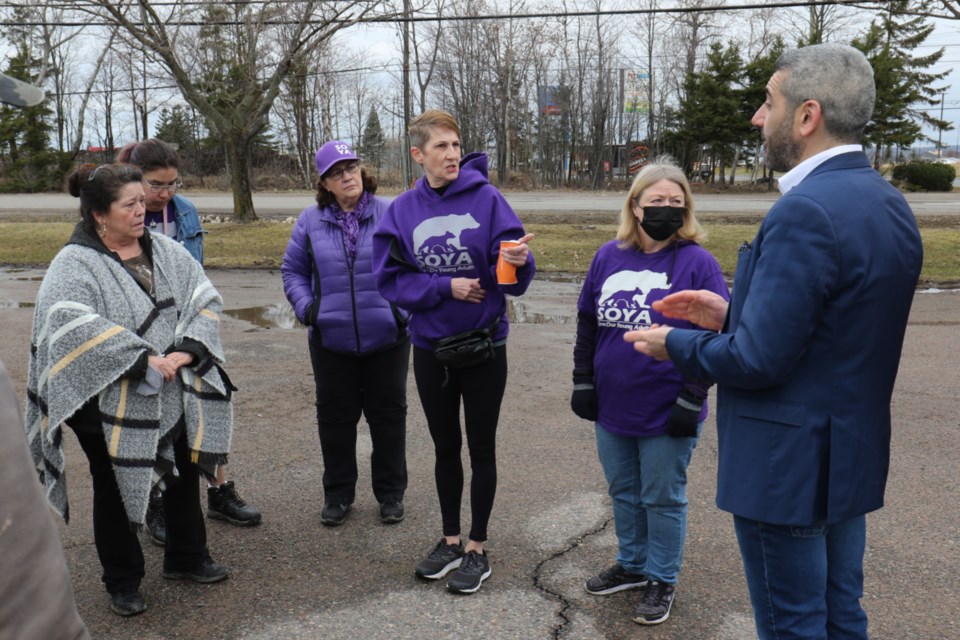The Ontario government has committed more than $18 million in capital grant funding for the construction of the Residential Withdrawal Management site in Sault Ste. Marie and has given its approval to award the construction contract.
Work on the building, located at 145 Old Garden River Road, is slated to begin next month and is anticipated to be completed by December 2022. The public tender process for the project concluded March 25.
Sault Ste. Marie MPP Ross Romano, making the announcement outside the future home of the facility Monday, said there’s “no one solution” to address mental health and addictions challenges, and that the forthcoming facility that will eventually house inpatient services is just one piece of the overall continuum of care.
“It’s really important that we remember all the services that exist within our community, all those wraparound supports that exist within our community. We want to ensure that we’re doing everything we can to prevent harm before someone has to reach a hospital,” said Romano. “We want to ensure that we have as many outpatient services that we can possibly have to try to prevent someone having to get to a hospital.”
The project will see over 16,000 square feet renovated in the 28,000 square-foot building in order to house 20 adult withdrawal management beds. The facility will complement four acute care beds at Sault Area Hospital (SAH). The Ministry of Health provided SAH with up to $1.7 million to support planning for the project in 2017, bringing the total funding provided by the ministry to more than $19 million.
Year-to year operational funding of $343,000 was announced by the province in May of last year.
The hospital’s initial proposal for a residential withdrawal management facility in the 2017-2018 fiscal year requested provincial funding for 33 beds.
“There's been extensive work and research done, and the expert analysis indicates that 20 beds is the number of beds that we need,” said Romano. “When combining that with all of the outpatient services that we have in the community, that has made this number what it is here today.”
Lisa Case, director of mental health and addiction services for SAH, told SooToday that after undergoing needs-based planning in Algoma with Ontario Health North and community partners, the hospital has expanded rapid access addiction medicine (RAAM) and added home mobile withdrawal management, the Community Wellness Bus and addiction medicine consultation in hospital in order to complement residential care.
“Today’s announcement and recent service enhancements will contribute to a smoothing of the current volumes of overrepresentation in residential treatment settings. This will allow for the right level of care to be accessed close to home, in our community,” said Case. “The investment will allow for an increased capacity to provide higher quality and safer care for those with complex addictions and mental health presentations, and for staff and physicians to focus on therapeutic interactions within their area of expertise.”
A total of 56 suspected drug-related deaths were reported in the Algoma Public Health region in the first eight months of 2021, compared to 53 in the first eight months of 2020. The number of naloxone kits dispensed from pharmacies, community agencies and the health unit in the first eight months of 2021 surpassed the total amount of kits distributed in 2020.
Opioid-related hospitalizations and visits to the emergency department have also increased steadily in the Algoma Public Health region since 2019.
“We’ve needed this care for a long time. We’ve needed it for a long time. We’ve needed it for years,” said Sault Ste. Marie Mayor Christian Provenzano, who attended Monday’s announcement. “This problem has gotten worse year over year, and so I’m glad that we’re here today, and I’m glad that the project is moving forward.
“I wanted to recognize really the sincere and significant contribution of the citizen advocacy groups for keeping this on the forefront and keeping the pressure up on it. It’s been tremendous leadership, and I’m grateful for it.”
Sault Area Hospital Chief Executive Officer Ila Watson said Monday’s announcement has been “a long time coming.”
“We do need to note that for a lot of people, it is too late,” said Watson. “We have a long path ahead of us, and we’re really looking forward to having this facility open.”
Save Our Young Adults (SOYA) member Trudy Wamsley told SooToday that Monday’s announcement came too late for her son, Nick Moore, who died due to substance use in 2018. It was because of someone adding enough fentanyl to the cocaine to kill him, she said.
“Things have just gotten worse. It’s scary. I’m glad I don’t have any small children growing up in this town,” she said.
Romano, along with other speakers at Monday’s announcement, acknowledged the human cost of the opioid crisis locally.
“...for all of you out there who are suffering, for all of the families who are mourning, for all the families who are afraid — I tried to say this before: we’ve been with you all along, and the road doesn’t end here,” he said.
Sault Area Hospital moved the residential withdrawal management program into the hospital in March of 2020 after an appliance fire forced the closure of the 16-bed detox centre located at 911 Queen Street East.
